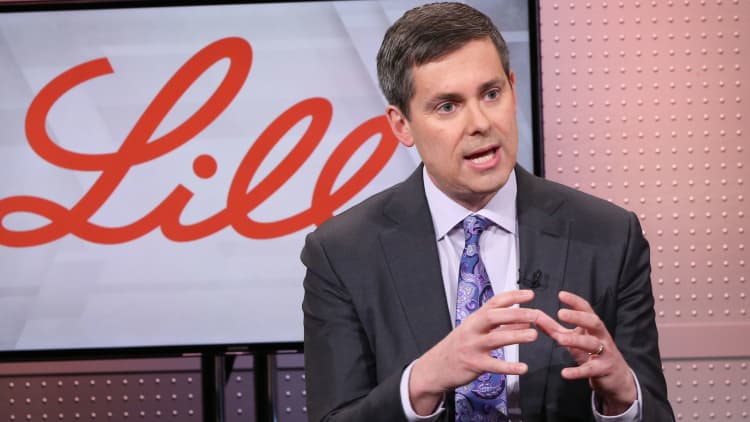
Eli Lilly Chairman and CEO Dave Ricks told CNBC on Tuesday the company's coronavirus antibody drug will still be an important treatment for Covid-19, even if a widely available vaccine is brought to market.
The Food and Drug Administration granted Eli Lilly's antibody treatment emergency use authorization Monday evening, allowing it to be given to nonhospitalized patients who are at high risk of developing severe Covid-19. The goal of this class of drugs is to boost the immune system's defenses and prevent the virus from infecting human cells.
On Monday morning, Pfizer released data from its late-stage clinical trial that showed its vaccine candidate was more than 90% effective in preventing Covid-19 in patients who had not been infected previously.
"I am so pleased to hear about Pfizer's news yesterday, and we hope that makes us obsolete. I don't think it will," Ricks said on "Squawk Box."
"Even in well-controlled [other] respiratory illness ... we still have vaccination and antibody therapy because some patients escape the vaccine and still get the condition, and they need to be managed with a therapy," he added. "This will be useful in the long term, hopefully at much lower volumes" in fighting Covid-19 as well.
Ricks said the antibody drugs are likely to play a central role in developing countries, where distribution of a vaccine to prevent infection is likely to prove more challenging than in the United States. In particular, Ricks pointed to the messenger RNA-based vaccines from Pfizer and its German partner, BioNTech, and the effort from Moderna. Pfizer's vaccine has a storage temperature of minus 94 degrees Fahrenheit, while Moderna has said its vaccine requires storage at minus 4 degrees Fahrenheit.
Those vaccines, Ricks said, "are very complicated to get around, and in countries like India and developing countries around the world, it will take some time to both make and deploy something like that, if that's what we have. They need a bridge that is much longer, perhaps, than the developed world, and that's why we're committed to get this antibody to patients no matter where they are in the world. And that could go on for years, actually."
President Donald Trump received an antibody drug similar to Lilly's for his Covid-19 diagnosis last month. Trump, who received a therapy produced by Regeneron, has touted those types of treatments to help patients. Chris Christie, former New Jersey governor and ally of the president, was given the Lilly treatment when he was in the hospital with coronavirus earlier this fall.
Eli Lilly submitted its emergency use authorization in early October. The stock was moving higher by more than 4% in premarket trading Tuesday. Regeneron also has applied for emergency use authorization for its antibody treatment.
In late October, a government-run clinical trial studying Eli Lilly's antibody treatment in hospitalized coronavirus patients was stopped because it looked "unlikely" that it would provide a benefit to patients. At the time, Ricks told CNBC he was confident the antibody therapy would be beneficial for Covid-19 patients earlier in their diagnosis.
A study in the New England Journal of Medicine, published in October, found 1.6% of trial participants who received Eli Lilly's antibody treatment ended up hospitalized or had a coronavirus-related visit to the emergency room, compared with 6.3% of people who received the placebo.
Eli Lilly shipped about 88,000 doses of its antibody therapy on Monday, Ricks said, and supply will continue to ramp up from there. "We'll have 10,000 more or so every couple of days coming out until December," he added. In December, the company will produce about 800,000 doses.
Clarification: Ricks' interview on CNBC was Tuesday, as mentioned in the first paragraph.


